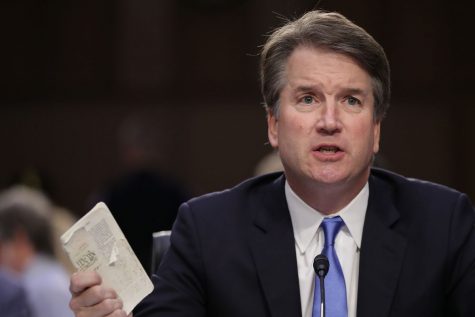Political Awareness at University School
November 5, 2018

Last week, I was talking with one of my friends, and I mentioned what was going on in Washington D.C at the time. Judge Brett Kavanaugh was testifying to the Senate about whether he had drunkenly sexually assaulted Christine Blasey Ford when they were in high school. Every newspaper or online source seemed to mention him on the front page in some way. For this reason, I assumed that the student would know what I was talking about. Unfortunately, the student had no idea what I was talking about. He didn’t know about the nomination of the Judge, who would shift the outlook world’s highest court for at least a generation, let alone the three allegations against him. I was dumbfounded even more when this happened with yet another classmate. I began asking myself some questions. How could soon-to-be voter not know that they were in the middle of one of the most tumultuous and important weeks in the recent American history?
It is important that we understand what and who some of us will be voting for on November 6th. If someone goes to the polls without understanding this, his or her votes will be merely based on a partisan allegiance with no logical reason behind them. He or she will be blindly following a candidate or idea they may not even agree with.
So how can high school students get a basic education of what goes on in the world? Only a select few high school students have the time or access to watch network news, and the same goes for newspapers. That means that if a high schooler wanted to keep in touch with the news, he or she would have to have access to a digital format. Unguided access to this typically ends up with students developing unsupported and even false ideas, since Snapchat and Instagram have few unbiased sources in them.
Finally, how much responsibility to educate students on current events falls on the school? The reason many students are uninformed is because they make no attempt to follow the news, so if the school were to make an attempt at reaching them, they would need to include discussions and lessons like the Society of Skeptics within the mandatory curriculum. That includes having discussions in humanities classes about current events, something my classmates and I have hardly experienced at US.
Optional opportunities like the Society of Skeptics or the Foreign Policy Club don’t do much in the way of education, as they are meant more for discussion on topics that are already known to the students there. An open forum within the classes that are educational would not only help students understand topics in the news, but would teach them to develop and defend their own opinions.
Another idea to help educate high schoolers is to bring in guest speakers. Being able to get information from an attached situation (like the Spencer Lecture Series) is something University School can provide that few other schools can. It would capture everyone in the audience, and allow them to see things from a perspective that differs from typical news coverage.
Whatever way it comes, it is imperative that high schoolers understand the politics of their country so they can be proactive citizens when the time comes to vote.
